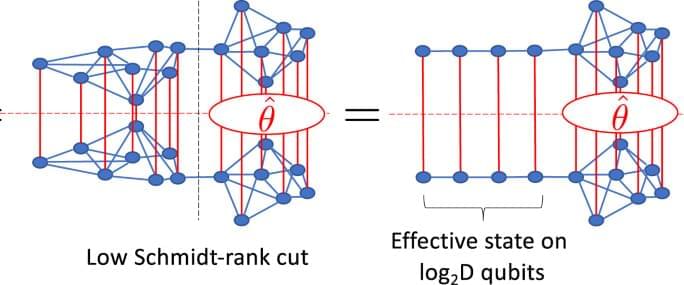
Category: internet – Page 160


Elon Musk’s SpaceX Signs First Deal With Major U.S. Airline To Provide Free Wi-Fi For Passengers
Elon Musk’s SpaceX has signed its first ever deal with a major U.S. airline to provide wireless internet to passengers for free using the Starlink satellite network.
The deal with Hawaiian Airlines, which could be implemented as soon as next year, is expected to increase pressure on rival airlines to provide free Wi-Fi for passengers.
“Hawaiian doesn’t currently offer inflight Wi-Fi and has an extensive network of flights over the Pacific Ocean, serving the mainland U.S., Japan, Australia and New Zealand, among other destinations, from Hawaii,” CNBC reported. “It plans to offer Starlink connectivity on its flights out of its home state to cities throughout the mainland U.S. and to its international destinations.”


Parallel quantum simulation of large systems on small NISQ computers
Basically all this says is that a basic quantum computer made of a simulation of an infinite quantum computer. So essentially infinite quantum computers could make the internet much more instant.
To parallelise our simulation on a small NISQ machine, we first identify partitions of the system where the effect of one partition upon the other can be summarised by a small amount of information. This is achieved by making Schmidt decompositions across the cut: \(\left|\psi \right\rangle =\mathopsum
olimits_alpha = 1Dlambda ^alpha \left|phi _L^alpha \right\rangle \left|phi _R^alpha \right\rangle,\) where \(\left|phi _L^alpha \right\rangle\) are an orthonormal set of states to the left of the cut and \(\left|phi _R^alpha \right\rangle\) the same on the right. The λα are known as the Schmidt coefficients and D the Schmidt rank or bond order. Retaining λα only above some threshold value provides a way to compress representations of a quantum state; the MPS construction can be obtained by applying this procedure sequentially along a spin chain4.
If an observation is made on the right-hand-side of such a cut, the effect of the quantum state on the left upon the observation can be summarised by just D variables corresponding to the Schmidt coefficients. This same effect can be achieved by an effective state on a spin chain of length \(log\,_2D\) —see Fig. 1 —which can be parametrised on the quantum circuit by an SU (D2) unitary VL. This encodes both the Schmidt coefficients λα and the orthonormal states \(\left|phi _L^alpha \right\rangle\). The latter does not contribute to observables on the right and so in principle, VL can be parametrised by just D variational parameters. The precise numerical values must be determined by solving a quantum mechanical problem on the left of the system. Similarly, for observations made to the left of the cut, the effect of the right-hand side can be summarised by a unitary VR.

A biological motor that consumes chiral fuel drives rotation in one direction around a single covalent bond
Bart Blommaertsif it helps. But don’t cut internet cables with that thing!!
Andreas StürmerFinally. Is it going to be a rail or car tunnel?
Eric KlienAdmin.
Andreas Stürmer Rail.
Jose Ruben Rodriguez Fuentes shared a link.
A team of researchers at the University of Manchester has created a molecular motor that consumes chiral fuel to drive rotation around a single covalent bond. In their paper published in the journal Nature, the group describes their work in developing a chemically powered directionally rotating motor and why they believe their efforts will result in similar systems being developed with other materials.

Researchers break world record for quantum-encrypted communications
Researchers in Beijing have set a new quantum secure direct communication (QSDC) world record of 102.2 km (64 miles), smashing the previous mark of 18 km (11 miles), The Eurasian Times reported. Transmission speeds were extremely slow at 0.54 bits per second, but still good enough for text message and phone call encryption over a distance of 30 km (19 miles), wrote research lead Long Guilu in Nature. The work could eventually lead to hack-proof communication, as any eavesdropping attempt on a quantum line can be instantly detected.
QSDC uses the principal of entanglement to secure networks. Quantum physics dictates that entangled particles are linked, so that if you change the property of one by measuring it, the other will instantly change, too — effectively making hacking impossible. In theory, the particles stay linked even if they’re light-years apart, so such systems should work over great distances.
The same research team set the previous fiber record, and devised a “novel design of physical system with a new protocol” to achieve the longer distance. They simplified it by eliminating the “complicated active compensation subsystem” used in the previous model. “This enables an ultra-low quantum bit error rate (QBER) and the long-term stability against environmental noises.”


A new quantum encryption breakthrough could lead to hacker-proof communication
Scientists from Beijing set a new quantum secure direct communication (QSDC) world record of 102.2 km (64 miles), a massive leap over the previous record of 18 km (11 miles), according to The Eurasian Times.
The research could eventually lead to a massive quantum communications network that would be virtually hacker-proof due to the nature of the technology.
The researchers, who published their findings in a paper in Nature, demonstrated transmission speeds of 0.54 bits per second, much slower than communications using classical computing devices. Still, this was fast enough for phone call and text message encryption over a distance of 30 km (19 miles).
Drones, hackers and mercenaries — The future of war | DW Documentary
A shadow war is a war that, officially, does not exist. As mercenaries, hackers and drones take over the role armies once played, shadow wars are on the rise.
States are evading their responsibilities and driving the privatization of violence. War in the grey-zone is a booming business: Mercenaries and digital weaponry regularly carry out attacks, while those giving orders remain in the shadows.
Despite its superior army, the U.S. exhausted its military resources in two seemingly endless wars. Now, the superpower is finally bringing its soldiers home. But while the U.S.’s high-tech army may have failed in Afghanistan, it continues to operate outside of official war zones. U.S. Special Forces conduct targeted killings, using drones, hacks and surveillance technologies. All of this is blurring the lines between war and peace.
The documentary also shows viewers how Russian mercenaries and hackers destabilized Ukraine. Indeed, the last decade has seen the rise of cyberspace armament. Hacking, sometimes subsidized by states, has grown into a thriving business. Digital mercenaries sell spy software to authoritarian regimes. Criminal hackers attack any target that can turn a profit for their clients.
But the classic mercenary business is also taking off, because states no longer want their official armies to go into battle. Former mercenary Sean McFate outlines how privatizing warfare creates an even greater demand for it. He warns that a world of mercenaries is a world dominated by war.
#documentary #dwdocumentary.

Massive Geomagnetic Storm: Coronal Mass Ejection From the Sun Could Knock Out the Power Grid and Internet
On September 1 and 2, 1859, telegraph systems around the world failed catastrophically. The operators of the telegraphs reported receiving electrical shocks, telegraph paper catching fire, and being able to operate equipment with batteries disconnected. During the evenings, the aurora borealis, more commonly known as the northern lights, could be seen as far south as Colombia. Typically, these lights are only visible at higher latitudes, in northern Canada, Scandinavia, and Siberia.
What the world experienced that day, now known as the Carrington Event, was a massive geomagnetic storm. These storms occur when a large bubble of superheated gas called plasma is ejected from the surface of the sun and hits the Earth. This bubble is known as a coronal mass ejection.
The plasma of a coronal mass ejection consists of a cloud of protons and electrons, which are electrically charged particles. When these particles reach the Earth, they interact with the magnetic field that surrounds the planet. This interaction causes the magnetic field to distort and weaken, which in turn leads to the strange behavior of the aurora borealis and other natural phenomena. As an electrical engineer who specializes in the power grid, I study how geomagnetic storms also threaten to cause power and internet outages and how to protect against that.